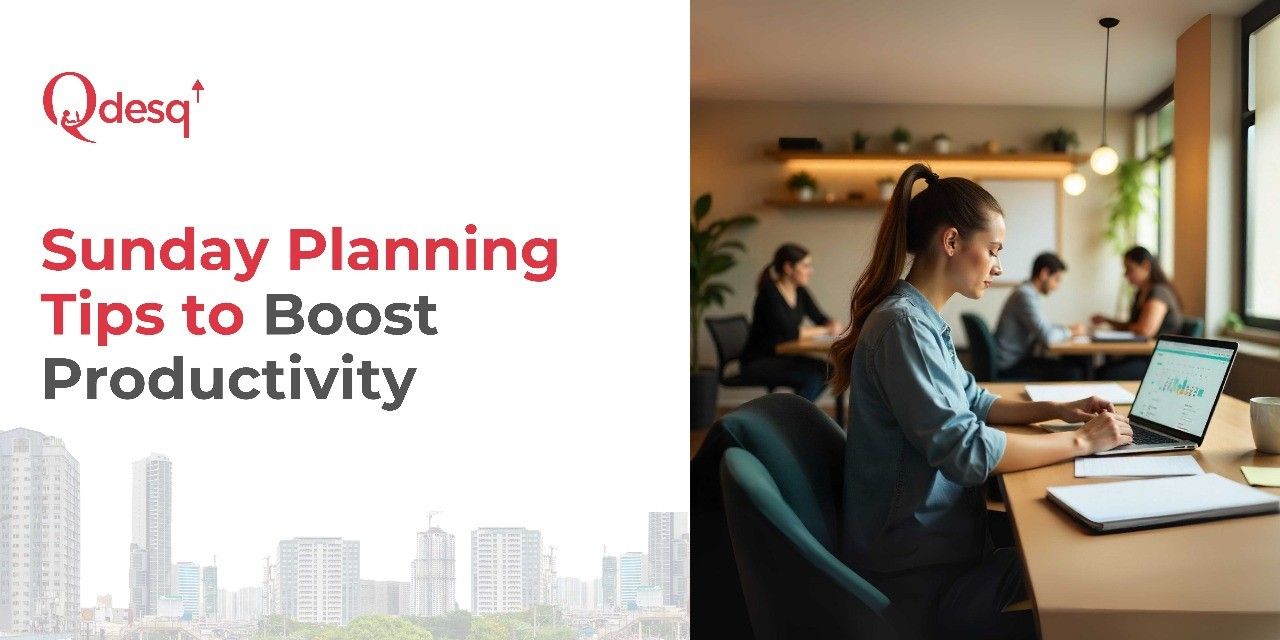Have you ever started a Monday morning feeling overwhelmed, unsure where to begin? It’s a common scenario when the week starts without a clear plan. Stress piles up, focus slips, and important tasks get lost in the shuffle.
The solution is simple yet transformative: a Sunday planning ritual. Spending just 30–45 minutes on your weekly plan can bring calm, clarity, and a productivity boost. Whether you work from home, a corporate office, or a coworking space, planning changes how you approach your week.
This guide will show you how to establish a Sunday planning habit that helps you set priorities, manage your time effectively, and align your work with your energy. From reflecting on the past week to time-blocking, these strategies keep your workflow smooth and stress low—no matter where you work.
Why Sunday Planning Works
Sunday offers a perfect window to prepare for the week ahead. Without this preparation, many people start the week reacting to tasks as they come—wasting energy and mental focus.
A clear Sunday plan provides direction and purpose. You avoid confusion about what’s most important, reduce overwhelm, and make decisions aligned with your goals. Starting Monday in control of your schedule increases focus, confidence, and overall effectiveness.
Reflect on the Week That Was
Effective planning begins by looking back. Ask yourself:
- What went well last week?
- What slowed me down?
- Which lessons can I carry forward?
Reflection sharpens self-awareness and highlights distractions to fix. Long meetings drained your afternoons, or working from home came with interruptions. Recognising these patterns allows you to plan proactively, like reserving quieter workspaces in coworking areas or adjusting your meeting schedule.
Identify Your Top Priorities
One common trap is filling your weekly plan with too many minor tasks. Instead, focus on three to five key goals that will have the most impact.
For freelancers and professionals in coworking spaces, clear priorities help maintain focus amid the flexibility of working in a shared environment. Knowing your main objectives ensures that each work session is meaningful and productive.
Time Block Like a Pro
Time blocking—reserving chunks of your day for specific activities—adds structure and protects your attention from distractions.
For example:
- Morning: Deep-focus work on complex projects
- Afternoon: Collaboration, meetings, or routine tasks
- Evening: Personal or restorative activities
Visualising your schedule reduces decision fatigue, increases flow, and allows you to balance different types of work effectively.
Work With Your Energy
Everyone has natural energy peaks and dips. During Sunday planning, identify your peak productivity hours and reserve them for tasks that require focus and concentration, such as challenging or creative work. Schedule lighter or restorative activities during lower-energy periods.
Coworking spaces make this even easier: take a short walk, grab coffee with a peer, or use communal lounges to recharge. Balancing energy with productivity ensures sustained focus and avoids burnout.
Make Your Plan Visible and Review It Daily
Ideas only work if they’re captured clearly. Use a notebook, digital planner, or wall-mounted board to track your week. Teams in coworking spaces can benefit from shared planning tools to synchronise efforts and enhance accountability.
Review your plan at the start and end of each day. Daily check-ins enable you to adjust and stay on track despite shifting priorities.
Ritualise Your Sunday Planning
Like any habit, the benefits compound over time. Making Sunday planning a weekly ritual helps train your mind to shift from reactive to proactive thinking. Over time, skipping a session feels like missing an essential part of your workflow. Consistency turns planning into a productivity superpower.
Why Planning Boosts Coworking Success
Coworking spaces thrive on flexibility—but without planning, that freedom can become chaos. Reserve desks for deep-focus sessions, book meeting rooms for collaborative work, and schedule communal activities during breaks. Thoughtful planning enables you to maximise the potential of flexible spaces, transforming them into effective productivity hubs.
Final Words
Sunday planning lays the foundation for a balanced, focused, and low-stress workweek. Reflect on the past, prioritise top goals, time block effectively, and align work with your energy. Combine these habits with smart workspace choices, and you’ll unlock your full potential.
Start your productive week ahead by exploring flexible coworking spaces with Qdesq, the partner that helps you plan, book, and work smarter. Take control of your schedule, your workspace, and your week.











